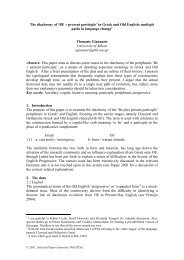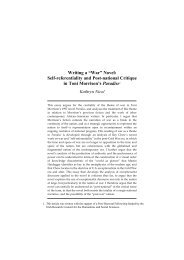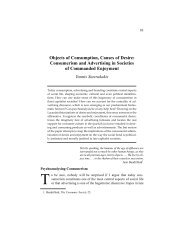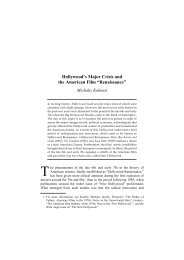19 International Symposium on Theoretical and Applied Linguistics ...
19 International Symposium on Theoretical and Applied Linguistics ...
19 International Symposium on Theoretical and Applied Linguistics ...
Create successful ePaper yourself
Turn your PDF publications into a flip-book with our unique Google optimized e-Paper software.
G E N E R A L S E S S I O N<br />
hypotheses we hope to c<strong>on</strong>tribute to the elaborati<strong>on</strong> of a general linguistic theory <strong>on</strong> the semantics in<br />
word formati<strong>on</strong>.<br />
References<br />
Booij G. & R. Lieber 2004. On the paradigmatic nature of affixal semantics in English <strong>and</strong> Dutch. <strong>Linguistics</strong> 42/2,<br />
327-357.<br />
Charit<strong>on</strong>idis Ch. 2005. Verb Derivati<strong>on</strong> in Modern Greek. Frankfurt: Peter Lang.<br />
Lieber, R. 2004. Morphology <strong>and</strong> Lexical Semantics. Cambridge: Cambridge University Press.<br />
Plag, I. <str<strong>on</strong>g>19</str<strong>on</strong>g>99. Morphological Productivity. Structural C<strong>on</strong>straints in English Derivati<strong>on</strong>. Berlin/N. York: Mout<strong>on</strong> de<br />
Gruyter.<br />
Ralli, A. 2005. Morpholojia. Athens. Patakis.<br />
Roger C. 2003. Derived change-of-state verbs in French: a case of semantic equivalence between prefixes <strong>and</strong><br />
suffixes. Acta Linguistica Hungarica 50/1-2, 187-<str<strong>on</strong>g>19</str<strong>on</strong>g>9.<br />
Language Alternati<strong>on</strong> in a Greek Supplementary School<br />
Roxani Faltzi<br />
University of Edinburgh<br />
roxfaltzi@gmail.com<br />
This paper reports <strong>on</strong> the findings of a research project which explored language alternati<strong>on</strong> patterns<br />
in the Greek supplementary school in Edinburgh, UK. Supplementary schools remain under-<br />
examined especially regarding the actual interacti<strong>on</strong> <strong>and</strong> the use of language alternati<strong>on</strong> in the<br />
learning process. Previous studies have drawn data from mainstream bilingual classrooms focusing<br />
more <strong>on</strong> the functi<strong>on</strong>s of language alternati<strong>on</strong> <strong>and</strong> less <strong>on</strong> its organisati<strong>on</strong>al patterns.<br />
The present study has identified <strong>and</strong> explored language alternati<strong>on</strong> patterns relying <strong>on</strong> a set of data<br />
drawn from over 25 hours of audio recorded less<strong>on</strong>s, which were collected from March 2007 until June<br />
2007.Classroom interacti<strong>on</strong>s between bilingual in Greek <strong>and</strong> English pupils <strong>and</strong> the teacher were<br />
transcribed <strong>and</strong> then analysed based <strong>on</strong> Auer (<str<strong>on</strong>g>19</str<strong>on</strong>g>84, 2000) <strong>and</strong> Gafaranga’s (<str<strong>on</strong>g>19</str<strong>on</strong>g>99, 2000, 2007)<br />
c<strong>on</strong>versati<strong>on</strong> analytic model. The key findings revealed that different organisati<strong>on</strong>al patterns of<br />
language alternati<strong>on</strong> corresp<strong>on</strong>d to different functi<strong>on</strong>s. The results showed that when the main<br />
purpose of interacti<strong>on</strong> was language practice, teacher <strong>and</strong> students adopted the Greek m<strong>on</strong>olingual<br />
medium as a mean for their interacti<strong>on</strong>. By c<strong>on</strong>trast, when language alternati<strong>on</strong> was used for the<br />
establishment of interpers<strong>on</strong>al relati<strong>on</strong>s, the speakers adopted the bilingual medium. I thus argue that<br />
a different orientati<strong>on</strong> to language alternati<strong>on</strong>, based <strong>on</strong> the c<strong>on</strong>text of interacti<strong>on</strong> <strong>and</strong> the functi<strong>on</strong> it<br />
accomplishes, is essential for a better interpretati<strong>on</strong> of language alternati<strong>on</strong> in the supplementary<br />
classroom c<strong>on</strong>text.<br />
This research is innovative firstly because it draws material from an under-researched instituti<strong>on</strong>al<br />
c<strong>on</strong>text <strong>and</strong> sec<strong>on</strong>d because it brings a comparative dimensi<strong>on</strong> to the code switching studies by<br />
c<strong>on</strong>trasting classroom language alternati<strong>on</strong> in different sociolinguistic settings. It can also assist with<br />
educati<strong>on</strong>al management c<strong>on</strong>cerns, language policies <strong>and</strong> teaching pedagogies.<br />
References<br />
Auer, P. <str<strong>on</strong>g>19</str<strong>on</strong>g>84. Bilingual C<strong>on</strong>versati<strong>on</strong>. Amsterdam: John Benjamins.<br />
Auer, P. 2000. A c<strong>on</strong>versati<strong>on</strong> analytic approach to code switching <strong>and</strong> transfer. In: Li Wei (Ed.), The Bilingualism<br />
Reader. L<strong>on</strong>d<strong>on</strong> <strong>and</strong> New York: Routledge, 166-187.<br />
Gafaranga, J. <str<strong>on</strong>g>19</str<strong>on</strong>g>99. Language choice as a significant aspect of talk organizati<strong>on</strong>: the orderliness of language<br />
alternati<strong>on</strong>. TEXT: An Interdisciplinary Journal for the Study of Discourse, <str<strong>on</strong>g>19</str<strong>on</strong>g>(2): 201-225.<br />
Gafaranga, J. 2000. Medium repair vs. other-language repair: telling the medium of a bilingual c<strong>on</strong>versati<strong>on</strong>.<br />
<str<strong>on</strong>g>Internati<strong>on</strong>al</str<strong>on</strong>g> Journal of Bilingualism, 4: 327-350.<br />
Gafaranga, J. 2007. Code-switching as a c<strong>on</strong>versati<strong>on</strong>al strategy. In: Auer, P. & Li Wei (Eds.), H<strong>and</strong>book of<br />
Multilingualism <strong>and</strong> Multilingual Communicati<strong>on</strong>. Berlin, New York: M<strong>on</strong>t<strong>on</strong> de Gruyter.<br />
Finite complementati<strong>on</strong> in the synchr<strong>on</strong>y <strong>and</strong> diachr<strong>on</strong>y<br />
of Greek <strong>and</strong> in other Balkan languages<br />
1 Ioannis Fykias & 2 K<strong>on</strong>stantinos Sampanis<br />
1&2 University of Salzburg<br />
1 ioannis.fykias@sbg.ac.at & 2 k<strong>on</strong>stantinos.sampanis@sbg.ac.at<br />
This paper will utilize some theoretical <strong>and</strong> methodological insights of earlier <strong>and</strong> more recent<br />
syntactic research (B. Joseph (<str<strong>on</strong>g>19</str<strong>on</strong>g>83), A. Terzi (<str<strong>on</strong>g>19</str<strong>on</strong>g>92) G. Alboiu (2004) O. Tomić (2006)) in a detailed<br />
examinati<strong>on</strong> of the well known sprachbund syntactic phenomena associated with the lack of infinitival<br />
<str<strong>on</strong>g>19</str<strong>on</strong>g> th ISTAL 13






